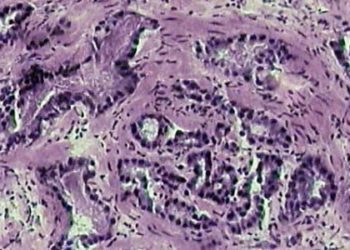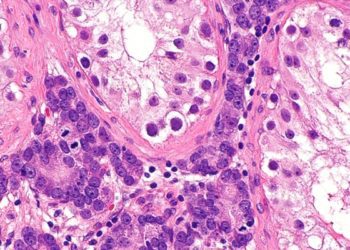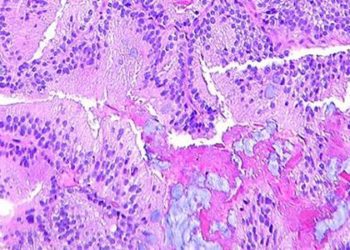Higher incidence of germline DNA-repair mutations in men with metastatic prostate cancer
1. Men with metastatic prostate cancer had a significantly higher incidence of germline mutations mediating DNA-repair processes compared to men with localized prostate cancer.
2. This study created the potential for earlier detection of germline mutations and targeted therapy earlier for men with metastatic prostate cancer.
Evidence Rating Level: 2 (Good)
Study Rundown: Prostate cancer is a common malignancy among men having a heterogeneous biology which can result in different clinical presentations, and prognostication, of disease. Prostate cancer has a high degree of genetic heritability. At present, over 100 gene variants have been identified which contribute to the excess risk of familial prostate cancer, such as BRCA1, BRCA2, MHSH2, and HOXB13. While genetic variants have been well described for those with localized prostate cancer, the same cannot be said for those with metastatic disease. This study aimed to establish the frequency of DNA-repair genes in metastatic prostate cancer using multiplex sequence assays in 20 DNA-repair genes, which are known to be associated with autosomal dominant cancer-predisposition. This study found a significantly higher incidence of germline mutations associated with DNA-repair in those with metastatic prostate cancer, compared to men with localized disease. In addition, these mutations were independent of age at diagnosis, and family history of cancer. The major strengths of this study include the multiple cases series from multiple centres that contributed tissue samples for DNA analysis. Furthermore, the findings present promise to detect these DNA-repair mutations through screening that can aid in personalizing and targeting therapy for men with metastatic prostate cancer. Although there were many cases from which to draw tissue samples from, a limitation of the study was the inability to standardize DNA sequence analyses across all the institutions. Another limitation was the focus on finding genes with deleterious DNA-repair mechanisms, and not how different genes may come together to influence disease. There were also very few men in the study who were above 70 years old at diagnosis which limits its generalizability.
Click to read the study, published today in NEJM
Relevant Reading: A meta-analyses of genome-wide association studies to identify prostate cancer susceptibility loci associated with aggressive and non-aggressive disease.
In-Depth [retrospective cohort study]: This study aimed to establish the frequency of germline mutations in DNA-repair genes in men with metastatic prostate cancer. There were 692 men who had confirmed metastatic prostate cancer through tissue biopsy, with no prior selection for family history or age at diagnosis. Germline DNA was Isolated, and multiple sequencing assays were used to assess mutations in 20 DNA-repair genes known to be associated with autosomal dominant cancer-predisposition syndromes. Of the 692 men identified, 82 (11.8%) had one pathogenic germline mutation associated with DNA-repair processes. Of these 82 genes, 79 had truncating mutations and 5 known deleterious missense mutations. There were 16 mutations found including: BRCA2 (37 mutations – 44% of total mutations), ATM (11 – 13%), CHEK2 (10 – 12%), BRCA1 (6 – 7%), RAD51D (3-4%), and PALB2 (2-4%). There was no difference in mutations according to family history of cancer or age at diagnosis. In the Cancer Genome Atlas prostate cancer study, the frequency of germline mutations in DNA-repair genes was 23 out of the 499 (4.6%) men with metastatic prostate cancer, which was significant when compared to those men without the gene mutations (p < 0.001).
Image: PD
©2016 2 Minute Medicine, Inc. All rights reserved. No works may be reproduced without expressed written consent from 2 Minute Medicine, Inc. Inquire about licensing here. No article should be construed as medical advice and is not intended as such by the authors or by 2 Minute Medicine, Inc.








